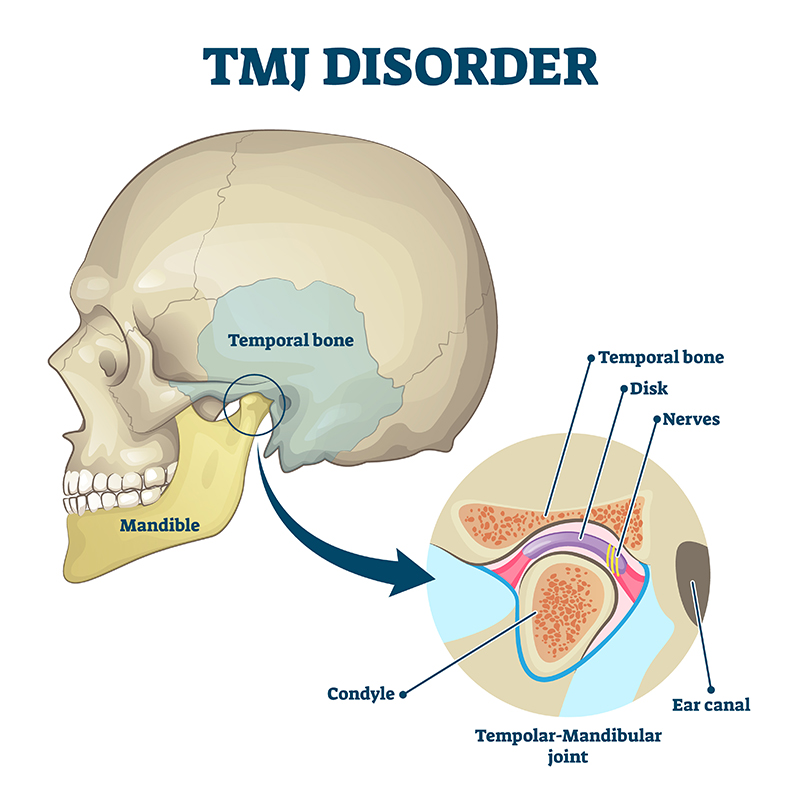TMJ Treatment
What is TMJ?
TMJ stands for Temporomandibular Joint. It’s a hinge joint that connects your jawbone to your skull. This joint allows you to move your jaw up and down and side to side, enabling actions like chewing, talking, and yawning.
What is TMD?
Temporomandibular Joint Disorder (TMD) refers to a group of conditions that cause pain and dysfunction in the jaw joint and muscles that control jaw movement. Symptoms of TMJ disorders can include jaw pain, difficulty chewing, clicking or popping noises when opening or closing the mouth, and locking of the jaw.

How is TMD Treated?
Treatment for TMJ disorders can vary depending on the severity and underlying cause but may include medication for pain management, physical therapy to improve jaw mobility and strength, dental treatments such as bite adjustments, or surgery in severe cases where conservative measures are insufficient to alleviate symptoms and restore proper function.
Need TMJ Treatment?
Call Dr. Grewal
(661) 515-4036
Meet the TMD Expert

Meet Dr. Grewal, a seasoned professional dentist with a wealth of experience specializing in the diagnosis and treatment of temporomandibular joint (TMJ) disorders. With a compassionate approach and a commitment to patient care, Dr. Grewal has dedicated her career to helping individuals find relief from jaw pain and dysfunction. Her expertise extends beyond traditional dental care, as she possesses a deep understanding of the complexities of TMJ disorders and their impact on overall oral health. Dr. Grewal combines her clinical proficiency with a warm demeanor, ensuring that each patient receives personalized attention and tailored treatment plans.
Whether it’s alleviating discomfort, restoring proper jaw function, or improving quality of life, Dr. Grewal is dedicated to providing comprehensive care and support to her patients on their journey to optimal oral health and wellness.
ACCIDENTS CAN LEAD TO TMJ ISSUES

How Accidents Can Lead to Temporomandibular Joint (TMJ) Issues
Direct Trauma: A blow to the head or face during an accident, such as a car crash or a sports injury, can directly impact the temporomandibular joint, causing inflammation, bruising, or damage to the joint structures.
Whiplash: Injuries involving sudden acceleration or deceleration, such as rear-end car collisions, can result in whiplash. This rapid movement can strain the muscles and ligaments around the jaw joint, leading to TMJ symptoms like pain, stiffness, and difficulty opening or closing the mouth.
Forceful Jaw Impact: Accidents involving a forceful impact to the jaw, such as a fall or a blow to the face, can dislocate the temporomandibular joint or cause misalignment of the jaw, contributing to TMJ dysfunction.
Stress and Tension: The physical and emotional stress associated with accidents can lead to clenching or grinding of the teeth (bruxism), which can exacerbate TMJ symptoms and contribute to jaw muscle tension and inflammation.
Posture Changes: Injuries sustained in accidents can result in changes to posture or alignment, which may affect the positioning of the jaw and increase the risk of TMJ dysfunction over time.

The Importance of Timely Evaluation and Treatment
Overall, the combination of direct trauma, muscle strain, stress, and postural changes resulting from accidents can contribute to the development or exacerbation of TMJ issues in affected individuals. It’s essential for accident victims experiencing TMJ symptoms to seek timely evaluation and appropriate treatment from a healthcare professional specializing in TMJ disorders.

How Accidents Can Lead to Temporomandibular Joint (TMJ) Issues
Direct Trauma: A blow to the head or face during an accident, such as a car crash or a sports injury, can directly impact the temporomandibular joint, causing inflammation, bruising, or damage to the joint structures.
Whiplash: Injuries involving sudden acceleration or deceleration, such as rear-end car collisions, can result in whiplash. This rapid movement can strain the muscles and ligaments around the jaw joint, leading to TMJ symptoms like pain, stiffness, and difficulty opening or closing the mouth.
Forceful Jaw Impact: Accidents involving a forceful impact to the jaw, such as a fall or a blow to the face, can dislocate the temporomandibular joint or cause misalignment of the jaw, contributing to TMJ dysfunction.
Stress and Tension: The physical and emotional stress associated with accidents can lead to clenching or grinding of the teeth (bruxism), which can exacerbate TMJ symptoms and contribute to jaw muscle tension and inflammation.
Posture Changes: Injuries sustained in accidents can result in changes to posture or alignment, which may affect the positioning of the jaw and increase the risk of TMJ dysfunction over time.
The Importance of Timely Evaluation and Treatment
Overall, the combination of direct trauma, muscle strain, stress, and postural changes resulting from accidents can contribute to the development or exacerbation of TMJ issues in affected individuals. It’s essential for accident victims experiencing TMJ symptoms to seek timely evaluation and appropriate treatment from a healthcare professional specializing in TMJ disorders.
Personal Injury Treatment
We will assess your dental injuries, create a comprehensive treatment plan, and work with you to restore your oral health.
TMJ Treatment
Don't deal with TMJ Disorder alone. Whether naturally occurring or the result of a personal injury, our TMJ experts are here to help
Reconstructive Treatment
Need oral reconstructive surgery for a dental injury? Dr. Grewal and her team will work closely with you to restore your smile and self-confidence.
28532 La Madrid Drive, Suite B
Santa Clarita, CA 91350
